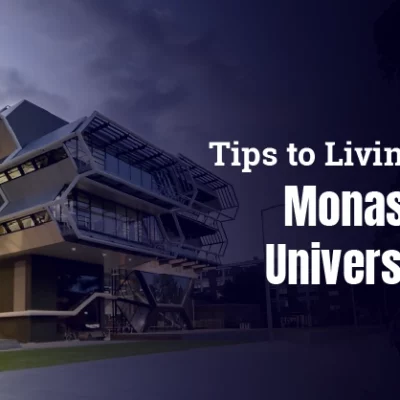On-Campus vs. Off-Campus Living: Which is Best in Melbourne?
Table of Contents
Deciding between on-campus and off-campus living in Melbourne can be challenging for international students. Both options offer unique benefits and cater to different lifestyles. On-campus living provides convenience and proximity to university facilities, while off-campus housing offers independence and a chance to explore the city. Understanding the facilities, costs, and lifestyle associated with each can help you make the right choice for your student experience in Melbourne.
Pros and Cons of On-Campus Living in Melbourne
Living on-campus is an excellent option for students seeking proximity to their classes and a community-oriented environment. However, it comes with its own set of challenges.
Pros of On-Campus Living in Melbourne
- Convenience: Being close to lecture halls, libraries, and other university facilities means less time commuting.
- Community Feel: On-campus accommodations foster a sense of belonging, with opportunities to meet other students through shared spaces and activities.
- Amenities Included: Most on-campus accommodations come with utilities, internet, laundry facilities, and sometimes meal plans.
- Safety and Security: University-managed accommodations often have 24/7 security, ensuring peace of mind for students and parents.
Cons of On-Campus Living in Melbourne
- Limited Space: Rooms are often small and shared, which may not suit students looking for privacy.
- Costly Meal Plans: Some accommodations require you to pay for a meal plan, which might not be flexible for your eating habits.
- High Demand: On-campus housing is often in high demand, and securing a spot can be competitive.
- Lack of Flexibility: Students might need to adhere to strict rules regarding visitors, quiet hours, and other policies.
Advantages and Drawbacks of Off-Campus Living in Melbourne
Off-campus living is a popular choice for students seeking more independence and flexibility. It’s particularly suitable for those who want to explore life in Melbourne beyond the campus boundaries.
Advantages of Off-Campus Living in Melbourne
- Wide Range of Options: Students can choose from shared apartments, private studios, or even co-living spaces tailored to student accommodation in Melbourne.
- Flexibility and Independence: Off-campus living allows you to create your own schedule, from cooking to hosting friends, without adhering to university policies.
- Cost Control: Renting off-campus often allows for more control over expenses like groceries, utilities, and transportation.
- Immersive Experience: Living off-campus gives you a chance to explore Melbourne’s vibrant neighborhoods, local cafes, and iconic spots like St. Kilda Beach or Queen Victoria Market.
Drawbacks of Off-Campus Living in Melbourne
- Commute Time: Depending on your location, commuting to university might take longer.
- Additional Responsibilities: Managing bills, groceries, and maintenance can be time-consuming.
- Higher Initial Costs: Renting off-campus often requires paying a bond (security deposit) and setting up utilities.
Cost Comparison: On-Campus vs. Off-Campus Living in Melbourne
Cost plays a pivotal role in choosing the right accommodation as a student in Melbourne. Whether you prioritize the convenience of living close to campus or the freedom to create your own living environment, understanding the financial implications of both options is essential. Let’s break down the financial aspects of both options.
Melbourne On-Campus Living Costs
On-campus living typically includes utilities, internet, and sometimes even meal plans, making it a convenient but potentially expensive choice. Below is the on-campus living costs for students wanting to stay in Melbourne:
| Expense | Approximate Cost (AUD/month) | Key Features |
| Accommodation | 1,200–1,800 | Includes utilities and internet |
| Meal Plan (if included) | 400–800 | Varies by university |
| Transportation | Minimal | Proximity to campus eliminates commute costs |
| Total | 1,600–2,600 |
Melbourne Off-Campus Living Costs
Off-campus living offers more flexibility in budgeting. While initial setup costs might be higher, students can tailor their expenses to suit their lifestyle. Below is the off-campus living costs for students wanting to stay in Melbourne:
| Expense | Approximate Cost (AUD/month) | Key Features |
| Rent | 800–1,500 | Shared apartments are more affordable |
| Utilities | 100–200 | Electricity, water, internet, etc. |
| Transportation | 50–150 | Public transport costs with a Myki card |
| Groceries | 200–400 | Allows students to cook their own meals |
| Total | 1,150–2,250 |
Key Takeaways:
- On-campus living offers convenience but comes at a higher cost.
- Off-campus living provides more financial control and flexibility but requires careful budgeting and time management.
Facilities and Amenities: What’s Included?
Your choice of accommodation can significantly impact your student life in Melbourne. Understanding what’s included in on-campus and off-campus living helps you make a well-informed decision based on your preferences and budget.
On-Campus Living: All-in-One Convenience
On-campus housing provides a hassle-free living experience with several amenities bundled into the rent. Here’s what you can typically expect:
- Utilities and Internet: Included in the rent, saving you the trouble of setting up services. Consistent internet connectivity helps support academic needs.
- Furnished Rooms: Standard furnishings like beds, desks, and wardrobes come with the accommodation, eliminating the need to purchase furniture.
- Meal Plans: Many types of accommodation include meal plans, which can be optional or mandatory. This simplifies dining but may limit your flexibility in food choices.
- Proximity to Campus: Living on-campus places you within walking distance of lecture halls, libraries, and labs, saving time on commuting.
- Recreational Facilities: Access to gyms, sports courts, and communal lounges fosters an active and social lifestyle.
While on-campus living offers great convenience, it comes with less flexibility in managing expenses and customizing your space.
Off-Campus Living: Customization and Flexibility
Off-campus accommodation allows students greater independence and control over their living situation. Some highlights include:
- Varied Options: Choose between apartments, shared houses, or private rentals to match your budget and preferences.
- Customizable Utilities: You can select your electricity, internet, and water providers, often leading to savings.
- Freedom to Decorate: Personalize your space to create a homely environment that suits your taste.
- Diverse Locations: Opt for accommodation closer to popular cafes, cultural spots, or the city center, giving you easy access to Melbourne’s vibrant social scene.
- Shared Costs: Split rent and utility bills with roommates to significantly lower living expenses.
Tips for Choosing the Right Accommodation in Melbourne
Finding the perfect student accommodation in Melbourne can feel overwhelming, but these tips can help you make the best decision based on your needs and budget:
- Evaluate Your Budget: On-Campus accommodation is an ideal choice if you want fixed, predictable costs. Prices often include utilities and amenities. Whereas, off campus accommodation offers flexibility in managing expenses. Sharing accommodation with roommates can significantly reduce the cost of living in Melbourne.
- Consider Your Lifestyle: If you prefer a structured environment with access to campus resources, on-campus living is ideal. But for those seeking independence and a chance to explore the city, off-campus housing provides greater freedom and opportunities to immerse yourself in Melbourne’s vibrant culture.
- Check Proximity to Public Transport: On-campus housing ensures easy access to university facilities but may require a commute to city hotspots. On the other hand, off-campus housing near train stations, tram stops, or bus routes can balance accessibility to campus and city life.
- Compare Costs and Inclusions: Understand what’s included in your rent:
- On-Campus: Often includes utilities, furniture, and access to amenities like gyms and common areas.
- Off-Campus: Requires setting up utilities and other services, but this allows greater customization and cost control.
Conclusion
Whether you choose the structured convenience of on-campus living or the flexibility of off-campus accommodation, both options can enrich your student journey in Melbourne. Consider your budget, lifestyle preferences, and academic needs before deciding. With its vibrant culture and excellent facilities, Melbourne ensures a fulfilling student life, no matter where you live.
Frequently Asked Questions
What is the difference between living on-campus and off-campus in Melbourne?
- On-Campus living in Melbourne: University dorms often involve shared living spaces, offering convenience but less privacy.
- Off-Campus living in Melbourne: Provides more independence, privacy, and flexibility in choosing roommates or living alone.
Is it better to live on or off-campus?
On-campus living in Melbourne is ideal for convenience, such as proximity to classes and free internet. Off-campus housing at Melbourne offers greater independence and privacy. Consider your budget and lifestyle preferences before deciding.
Is living in Australia expensive for international students?
International students in Australia should budget AUD 1,400 to AUD 2,500 per month for accommodation, food, transportation, and other living expenses. Costs may vary based on the city and lifestyle.
Where will you live while studying in Australia?
Australia’s major cities like Melbourne, Sydney, and Brisbane rank among the top 30 student-friendly cities globally for their quality of life, employment opportunities, and vibrant student communities.







